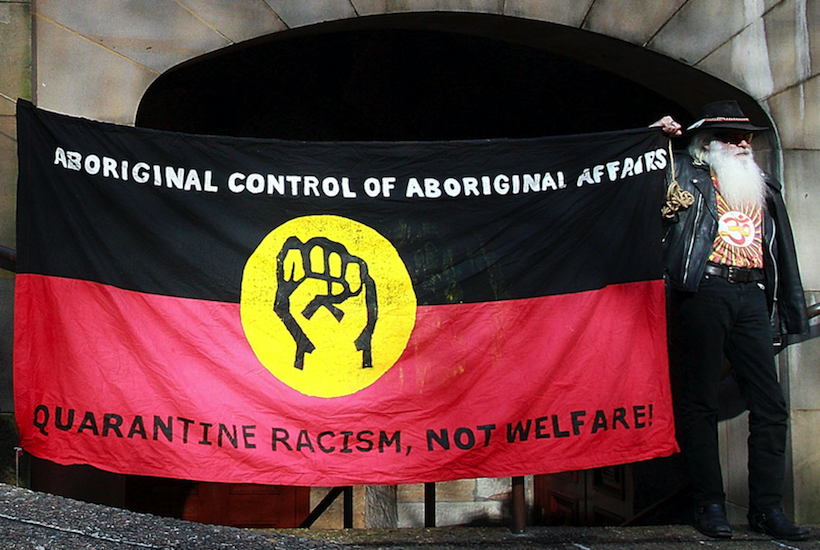Malcolm Turnbull has firmly, definitely, declared there would be no Referendum on the plans to establish a constitutionally enshrined indigenous advisory body, earning him criticism from indigenous voices such as Cape York leader Noel Pearson.
ATSIC – the Aboriginal and Torres Strait Island Commission, established in 1989 was one of the most controversial and expensive failures of Bob Hawke’s Labor government policies, one that promised much and delivered little.
John Howard, speaking in the House in 1989, stated:
If the Government wants to divide Australian against Australian, if it wants to create a black nation within the Australian nation, it should go ahead with [ATSIC]. In the process it will be doing a monumental disservice to the Australian community. If there is one thing above everything else, that we in this Parliament should regard as our sacred and absolute duty, it is the preservation of the unity of the Australian people. The ATSIC legislation strikes at the heart of the unity of the Australian people. In the name of righting the wrongs done against Aboriginal people, the legislation adopts the misguided notion of believing that if one creates a parliament within the Australian community for Aboriginal people, one will solve and meet all of those problems.
Now Malcolm Turnbull has echoed those thoughts, saying:
To have a national representative assembly… which would be in the Constitution. And to which only Aboriginal and Torres Strait Islanders could be elected, is contrary to the principles of equality of citizenship in Australia and it would inevitably be seen as a ‘third chamber’.
The ATSIC Bill was eventually passed after 90 amendments, making it the second-most amended piece of legislation since Federation. Supported by the Democrats (remember them ?) the Aboriginal and Torres Strait Islander Commission Act 1989 eventually was passed by Parliament in November 1989. People in Canberra started to refer to it as ‘the Aboriginal Parliament”.
ATSIC’s objectives included ensuring maximum participation of indigenous people in government policy formulation and implementation; promotion of indigenous self-management and self-sufficiency, and furtherance of indigenous economic, social and cultural development and ensuring coordination of Commonwealth, State, Territory and local government policy affecting indigenous people.
And to achieve these objectives, ATSIC was to advise and advocate government at all levels on indigenous issues and deliver and monitor Commonwealth government Indigenous programs and services. The Labor government of the day, urged on by its Aboriginal affairs minister Gerry Hand, saw the combining of representative and executive roles in one body, ATSIC, as being its key strength; less understood was that ATSIC, accountable to government for its massive funding, was, simultaneously, accountable to its Indigenous constituency, one that watched with jealous attention every dollar spent in Canberra.
The setting up of ATSIC in Canberra was a mighty enterprise; from the appointment of Lois O’Donoghue as ATSIC’s first Chairperson to the munificent details, no expense spared, in its Woden, Canberra, offices. The public servants loved it. There were jobs, jobs and more jobs. Unfortunately – and this was a major source of grievance and irritation with the unions, most of the jobs “designated positions” were reserved for Indigenous people. Planeloads of relatives were brought to Canberra and inducted into their new workplace.
Of course, some of the old hands – those public servants left over from the former Department of Aboriginal Affairs – yes, there really was one- hung grimly on, until they could retire and access their Comsuper pensions. A tea lady – the last of an extinct line from the old Department of Ab Affairs, as it was known in Canberra shorthand – was “let go”. With her went the Arnott’s Scotch fingers and chocolate digestives.
In 2003-04 ATSIC and its service delivery arm ATSIS (the ‘S’ stood for ‘Services’) received some $1.3 billing in funding, approximately 46 per cent of the total $2.8 billion Commonwealth funding on Indigenous affairs in that financial year.
A budget priority was economic development programs “job creation” such as the Community Development Employment Program (CDEP) scheme, still in force today. But along the way, some enterprising photographers managed to prise away enough money to fund photographic safaris to places like Maningrida and the Pit Lands, locations as exotic to many Canberra public servants as the moon
The posters that were eventually produced were spectacular but so were the bills. In 2003, then- Indigenous affairs minister Amanda Vanstone announced that a review In the Hands of the Regions: A New ATSIC concluded that ATSIC was not serving Indigenous Australians, as had been planned.
Stories of financial misdealing, assault, sexual harassment and fraud started to surface; some less serious – Cabcharge dockets used to pay for lunchtime visits to the casino, some more so.
Non- Indigenous public servants or contractees kept their heads down and their emails private. ATSIC, embroiled in controversy, was investigated for financial corruption and embezzlement of funds and its chairperson Geoff Clark accused of alleged participation in gang rapes in the 1970s and 80s. Clark, arrested for involvement in a brawl in a Victorian bar, was replaced by acting chairperson Lionel Quartermaine.
On 15 April 2004, John Howard announced ATSIC’s abolishment, saying “the experiment in elected representation for Indigenous people has been a failure.”
At midnight on 24 March 2005, ATSIC was formally abolished.
“All Australians,” the Prime Minister Malcolm Turnbull said, “whether they are First Australians whose forebears have been here for 60,000 years or whether they’ve just got their citizenship in a ceremony last week, have the same right to vote for, stand for and serve in our parliament.”
ATSIC failed. There should not be an attempt to resurrect it without significant safeguards.
Disclosure: Tina Faulk was a speechwriter for Lois (Lowitja) O’Donoghue
Got something to add? Join the discussion and comment below.
Got something to add? Join the discussion and comment below.
Get 10 issues for just $10
Subscribe to The Spectator Australia today for the next 10 magazine issues, plus full online access, for just $10.


























Comments
Don't miss out
Join the conversation with other Spectator Australia readers. Subscribe to leave a comment.
SUBSCRIBEAlready a subscriber? Log in